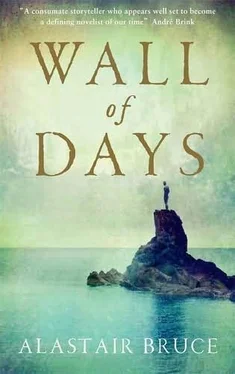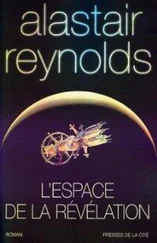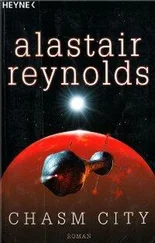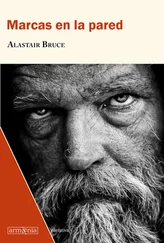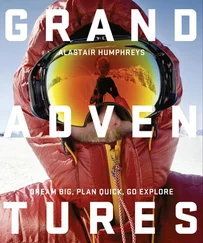Once these small tasks are done I have nothing to do but go to bed. No wine to drink, no tobacco to smoke. I lead a monk’s life here.
Sometimes I have trouble sleeping. In the beginning it was difficult and lately I have been having more trouble. A sign of age. I have a technique. When it is time I close my eyes and listen. I listen for the sound of the rain, the sound of the wind, the distant waves, the gulls.
I try to put other thoughts and memories to one side. Most often it works but every now and then I see faces, people behind my eyelids and the distant cry of a gull turns into the scream of a child and I am wide awake, chilled to the core.
I repair my nets and do my sums, scratch time on the walls of my cave. I sleep, when I can, from soon after sunset till sunrise and when I am awake I keep myself busy. I cannot do otherwise. I do not have to survey the island to the extent that I have. I do not have to be so meticulous about the peat and the forests. I could gorge myself, build up the fire, dry everything out, heat water for a wash. But I will not let go of certain standards by which I have lived my life. I swim in the sea every morning, eat, usually the remains of the previous night’s meal, and after that collect fuel. The afternoon I spend fishing or gathering food of some variety. There are a few edible leaves and tubers in the forest, seeds from the grasses, fungi. These, along with fish, crabs, seagulls, tubers and worms, are what sustain me.
When I walk on the shoreline I keep my head down, looking for crabs and dead fish. If I see a new species of fish or crustacean and it is relatively fresh, I put it in my bag for closer inspection in the cave.
Once I have examined it I eat it if I think it will not make me ill. So far I have been lucky, aside from the three varieties of fungus that made me nauseous. There is an area where kelp washes ashore. I cut pieces of this to take back as well. You can place shellfish in the tube and put it near a hot fire. The shellfish steams inside and comes out tender and tasting of the ocean. It is one of my few treats on the island.
Cooking in kelp is something I learned years ago. We were in the north-west sailing down the coast of another island in our small boats, returning from a campaign to find fertile land. That is all our world seems to consist of: a few islands separated by vast oceans. Some are deserts, some dead swamps, most are uninhabitable. Only a few are capable of supporting any life. We had found nothing. Most of the force was dead and we were being harried by the enemy. My men were hungry. The shoreline until then had been barren but that night we put to shore near a rocky stretch of beach and I sent a few men to see what they could find. They came back with a feast gleaned from the rocks and proceeded to cook it in kelp. It was unusual to find food like that and it turned out to be the last meal we had for days. As many of us died from starvation and illness as from the spears, arrows and guns of the enemy.
Once I have gathered food I check my fresh-water supply. I have three containers for water. There are no streams on the island but collecting water is easy. In a place where it never stops raining it would be hard to die of thirst. I have built up a circle of stones and hung a cloth over the top. The centre of the cloth is lower than the edges. I place one of the containers under the cloth. Most days it overflows.
When I have enough food and water I turn to my studies of the island. I am categorising the plants and animals here. So far I have counted five varieties of fish, two anemones, seaweed, limpets, two types of crab, seven types of fungus, four edible, three that cause nausea, three different types of grass, one type of tree, eight other plants, one species of gull and one of worm.
There isn’t much life on the island. There are no rats, no rabbits, no moles. The gulls are disappearing and there is no other birdlife. But that is commonplace and it is a small island. Cut off. It has probably been cut off for thousands of years unlike most islands I know, which appear to have been created in a more recent past.
I have trodden every inch of this island from the cliffs through the grasslands, through the forest to the peat beds and then around the island on the rocky and muddy coast, passing the fishing bay and the wilder eastern shore. You can cover a lot of ground in ten years. I have touched every rock, every plant, peered behind every tree and into every rock pool. I have tasted its roots, its water, its life. It holds fewer and fewer surprises for me. We are old companions.
I am measuring the island’s coastline, a difficult task when part of it slips into the sea every day. I am preoccupied with getting my representation of the island to scale and keeping it to scale, rubbing out charcoal outlines when I have to.
To make a complete circuit of the island, which is now around fifteen miles in circumference, takes four hours. I can mostly walk around on the beach or the rocks if the tide is right. If it is in when I reach the northern cliffs I have to climb them and leave the coast for a while. This adds half an hour to the walk. Of course, if I do my measurements it can take longer.
When I arrived the island was larger in circumference, about eighteen miles. I have lost three miles in ten years. If it continues at the same rate the island will last another fifty years. But it won’t. As the island’s circumference decreases, the relative area exposed to the sea and the elements increases, thereby speeding up erosion. The cliffs are disappearing more quickly now than ten years ago, more quickly today than yesterday. When the marshlands are breached by the sea, the process will speed up further and the island will disappear in no time at all. I have toyed with the idea of building a dyke and in fact I spent a month working on it a few years back but I have given up on the idea. The island is not mine to control. It will disappear one day and then I must go too, if I have not gone already. The end of both our histories.
The idea that a circle diminishes in size more quickly the smaller it gets is one that I think about often. I have spent evenings working out the rate of acceleration and so pinpointing the time when the island will disappear. Twenty years is the figure I have come up with. Twenty years from now the island will still be here but of a size no longer able to sustain me. I would spend my last minutes draped across the island, my toes in the southern ocean, my fingers in the northern. At least, that is how it will feel.
In truth, I don’t know whether this is correct. I am not a mathematician and I have no one to check my sums. The more I think about it the less obvious the idea is. You could argue that the smaller the island gets the slower it will disappear. Today it is shrinking less rapidly than yesterday, less than the day before. Perhaps there will come a time when the island will stop shrinking completely and it will go on and on long after I have withered away.
So, I fill my time this way. And it is a good use of my time. When I am gone I will leave a record for future generations, if there are any. It may be a small thing on a small island in a forgotten part of the world but I will leave a legacy, I will leave a history of this place.
There is something else I marked on my map. Somewhere else I visit.
About three years into my time here and for the next two-and-a-half years, every day at dusk I would take a stone about three times the size of my fist and place it in an area of the grasslands where little that is edible grows. The day after I’d place one next to it. After a row of thirty I’d start another. Thirty-one rows, the last with just seventeen stones in it. Each day for nine hundred and seventeen days.
And now each day I go back. It does not look like many. It looks almost insignificant, my stone field. Each day I stand and watch the stones splashed with rain. They reflect the clouds. In the dusk, with my head bowed, eyes half closed, each stone becomes alive, becomes a spirit. They swim around me, swallow me, pull me down into the grey water.
Читать дальше
